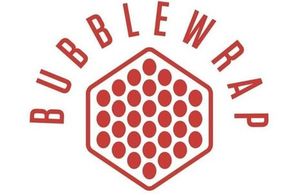Intellectual Property: Bubblewrap Waffle
A blend of old and new, Bubblewrap Waffle recreates a traditional Chinese delicacy with a top-secret twist on the recipe.

Bubblewrap wording with red emblem in a honeycomb design
Background
Bubblewrap Waffle (Bubblewrap) recreates a historical street dessert from Hong Kong and brings it to London’s Chinatown. Its founder Tony Fang was the first to bring this delicacy to the UK. The sweet treat consists of homemade egg waffle, topped with fresh gelato, fruit, cream, chocolate, sauce and biscuits.
Bubblewrap began as a university project. After nearly two years of trading in markets across London and catering for food festivals, Tony opened the first Bubblewrap store in March 2017. The products soon became a viral success. The desserts were featured in Facebook videos created by Time Out and Buzzfeed, amounting to 33 million views.
The brand
Tony knew from the start that intellectual property (IP) protection should be a fundamental part of his business plan. He explains:
During my study in Imperial College London, we were taught that IP protection is one of the most valuable assets to a company. We knew that we needed to protect any assets we create or own to prevent other people from taking advantage of our creation.
Tony filed a UK trade mark application for the company’s initial logo and a further application the following year for EU protection. After the official store opening, Tony sought advice from an attorney on the company’s IP strategy. He then protected the company name, Bubblewrap, through a trade mark application with the World Intellectual Property Office to protect the brand internationally.

two hands holding waffles with ice cream inside
Trade secrets
However, Tony knew that he would not only need to protect the company’s branding, but the all-important waffle recipe. The viral mania from the Facebook videos, alongside Bubblewrap’s unique ingredients, led to queues that lined the streets of Chinatown. Tony soon noticed stores opening across the UK selling replicas of their product:
We were not satisfied by some of the publicly available recipes. We started to develop our own, and even now, we are still refining them. In the first six months, it was always only me or my business partner who prepared and mixed the batter. We had people pretend to come to work for us and ask sensitive questions about the recipes. Our staff were followed and questioned after work.
Now each Bubblewrap employee is only aware of part of the secret recipe. There is a confidentiality clause in the standard employee contract and all those involved in the creation process sign a non-disclosure agreement. Tony explains:
Given the popularity of the Bubblewrap brand, protecting our IP is of vital importance to our business. Since our store opening, there have been many competitors selling similar products. Some used brand names that were very similar or even the same to ours. We have been able to use our IP rights to fight against these behaviours. It is really shocking that people will copy other’s creations so blatantly.
We realise that protecting our IP and business is going to be an ongoing and necessary part of our work.
Advice
Tony wishes to expand the business and develop franchise packs for people who love the Bubblewrap brand, product and want to be part of the family. Along the way, Tony says that they will continue to invest in protecting their branding assets and trade secrets:
A company’s IP strategy can have a big impact on business success. So, I would advise any company to be very mindful and careful about their IP. It is worth spending and investing some capital in seeking professional advice.
From our experience, don’t ignore your IP rights outside of the country you are operating in. Every good product needs a global IP plan.